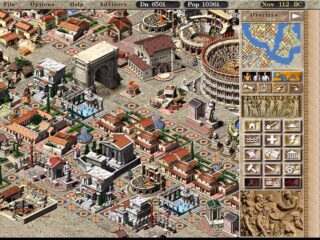SimTown, released by Maxis in 1995, is a spin-off of the famous SimCity but with a much simpler structure aimed at younger players. Developed for PC and later ported to Macintosh, the game presents itself as a “miniature” version of SimCity, where instead of managing an entire metropolis, players are responsible for building and maintaining a small town.
The core gameplay of SimTown revolves around constructing a well-balanced residential neighborhood by placing homes, schools, parks, public buildings, and stores. While it doesn’t involve complex economic systems or taxes, players must still meet the needs of the town’s inhabitants, manage waste, and maintain a healthy environment. A charming feature is the diary system, where various citizens write entries that give players insights into the town’s well-being and how things are progressing.
The game’s graphics are colorful and playful, with a cartoon-like style perfect for children. Every building has little animations, and the townspeople are designed to be cute and expressive. The atmosphere is lighthearted and relaxing, but the gameplay still offers enough challenge to engage a player’s problem-solving skills.
One of SimTown’s greatest strengths is its approachable interface. Maxis clearly intended the game to be easy for newcomers to pick up, even if they had never played a simulation game before. Despite its simplicity, SimTown still requires some strategic thinking—players need to balance the layout, ensure enough services for the residents, and respond to feedback to keep everything running smoothly.
Compared to more sophisticated Maxis titles like SimCity 2000 or SimAnt, SimTown is limited in scope. However, that was never the point. This game was designed as an entry-level experience, ideal for children or casual players looking for a fun way to learn about town planning and resource management. It even found popularity in educational settings, where teachers and parents appreciated its combination of fun and learning.
SimTown didn’t spawn direct sequels, but it played an important role in Maxis’s broader legacy of making simulation games accessible to a wider audience. Its gentle tone, easy mechanics, and creative freedom make it a unique and nostalgic part of simulation game history.















